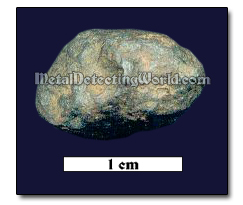METEORITE HUNTING, page 5
Why True All-Metal Mode is the Must?

Hunting meteorites must be conducted in true All-Metal mode in order to detect the smallest meteorites. You might need to master your detecting technique to a level of perfection in order to find the smallest meteorites. And there is a good reason for that.
You would have a slight chance to stumble over a meteorite of a football size - it would be like hitting a jackpot! Perhaps you would find a meteorite of a golf-ball size a few times. But most of your meteorite finds would be as small as a buck-shot.
The PI (Pulse Induction) detectors are the best for detecting meteorites because they do not have the Discrimination function and detect everything, i.e. they function in All Metal mode. Even though White's XLT metal detector is great for identifying meteorites because it has the S.A.T. (Self Adjusting Threshold) or Auto Tune function (by adjusting this parameter, you can achieve the true All Metal Mode) and V.D.I. numbers shown on display, it does not have enough sensitivity to detect smallest meteorites.
Besides PI detectors, gold detectors are more effective in meteorite detecting. You can see the best meteorite metal detectors listed on my "Detectors Required for Meteorite Hunting" page.
If you do not have a metal detector that can be operated in All Metal mode, you can test whatever detector with Discrimination you have and see if it is good for meteorite hunting. For this test, you need a small shot or a bird-shot made of steel, which measures 0.25 inch (6mm) in diameter.
Then you set the Discrimination level on you detector to the lowest possible and scan the bird-shot. If you receive a signal, your machine is good for detecting meteorites.
The smaller the meteorite's size, the more difficult it is to detect it not only because the signal would be weaker, but also because the nickel content would reduce the meteorite's conductivity, thus, making the V.D.I. number too low for the Discrimination scale.

Happy Meteorite Hunting!